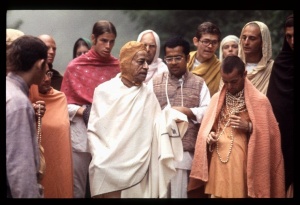SB 8.8.1

A.C. Bhaktivedanta Swami Prabhupada
TEXT 1
śrī-śuka uvāca
pīte gare vṛṣāṅkeṇa
prītās te 'mara-dānavāḥ
mamanthus tarasā sindhuṁ
havirdhānī tato 'bhavat
SYNONYMS
śrī-śukaḥ uvāca—Śrī Śukadeva Gosvāmī said; pīte—was drunk; gare—when the poison; vṛṣa-aṅkeṇa—by Lord Śiva, who sits on a bull; prītāḥ—being pleased; te—all of them; amara—the demigods; dānavāḥ—and the demons; mamanthuḥ—again began to churn; tarasā—with great force; sindhum—the ocean of milk; havirdhānī—the surabhi cow, who is the source of clarified butter; tataḥ—from that churning; abhavat—was generated.
TRANSLATION
Śukadeva Gosvāmī continued: Upon Lord Śiva's drinking the poison, both the demigods and the demons, being very pleased, began to churn the ocean with renewed vigor. As a result of this, there appeared a cow known as surabhi.
PURPORT
The surabhi cow is described as havirdhānī, the source of butter. Butter, when clarified by melting, produces ghee, or clarified butter, which is inevitably necessary for performing great ritualistic sacrifices. As stated in Bhagavad-gītā (BG 18.5), yajña-dāna-tapaḥ-karma na tyājyaṁ kāryam eva tat: sacrifice, charity and austerity are essential to keep human society perfect in peace and prosperity. Yajña, the performance of sacrifice, is essential; to perform yajña, clarified butter is absolutely necessary; and to get clarified butter, milk is necessary. Milk is produced when there are sufficient cows. Therefore in Bhagavad-gītā (BG 18.44), cow protection is recommended (kṛṣi-go-rakṣya-vāṇijyaṁ vaiśya-karma svabhāva jam).